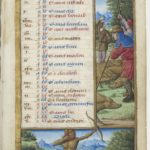
“November”, kalendar page from Les Petites Heures d’Anne de Bretagne (The Little Hours of Queen Anne of Bretagne), by the Maître des Triomphes de Pétrarque. From Bibliothèque nationale de France, Paris (France).
Temple was a popular preacher while a canon of Westminster Abbey. While Bishop of Manchester, he led other bishops in trying to mediate between the miners and coal owners during the General Strike. He also promoted an inclusiveness among Christians, inviting several nonconformist ministers to preach in the dicese.
While Archbishop of York, Temple wrote his three most important works: Nature, Man and God (1934); Readings in St John’s Gospel (1939 and 1940); and Christianity and Social Order (1942). Temple died on 26 October 1944, having served only a couple of years as Archbishop of Canterbury, but both the Anglican Church and the Episcopal Church commemorate him on 6 November.


